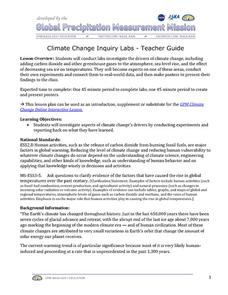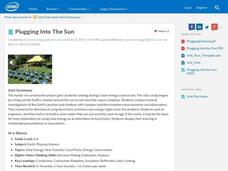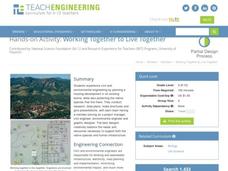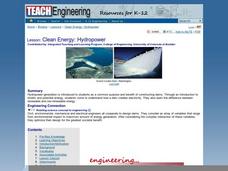California Academy of Science
Fish Prints
What do a dead fish, conservation, and paint have in common? The answer is a great lesson about fish anatomy, fun print making techniques, and unsustainable fishing practices. The class will start by making fish prints with a...
NASA
Climate Change Inquiry Lab
With global temperatures on the rise faster than ever recorded, the effects of a heating planet could be devastating. Allow learners to discover just what the world is in store for if the warming continues through a series of videos, a...
Cornell University
Fibers, Dyes, and the Environment
Nanofibers can be made through electrospinning or force spinning in order to reduce the negative impact on the environment. Pupils study the role of fibers and dye on the environment through a series of five hands-on activities. Then,...
Channel Islands Film
Human Impact on the Food Web of Santa Cruz Island
What happens when a non-native species is introduced onto an island? Santa Cruz Island, part of the Channel Island chain located off the coast of southern California, provides the perfect laboratory for young environmental scientists to...
Intel
Plugging into the Sun
What's cooking? A sizzling STEM unit challenges scholars to build a solar cooker that can successfully cook an egg. The unit opens with a study of Earth's rotation, the sun's energy, and shadows. Pupils use a compass and thermometer to...
Carnegie Mellon University
International Perspectives to Climate Change 2
A couple PowerPoint presentations are used to stimulate discussion about the perspectives of different countries on the issue of energy consumption. Afterward, they play a game in which each team is assigned a country, considers its...
Teach Engineering
Introduction to Water Chemistry
What are the issues surrounding water quality? Viewers of this short presentation gain information about the importance of clean water, the lack of fresh water, water contamination, and ways that engineers treat water.
Curated OER
Germs and Your Body
Students study germs and ways your body fights against disease. In this germs lesson students complete an activity that demonstrates where germs can get into your body.
Michigan Sea Grant
Wetlands
Wetlands may not sound particularly ornate, but they are as important as any habitat! With a hands-on activity, young scientists build a wetland model and observe its many functions in action. They discover the importance of wetlands to...
Michigan Sea Grant
Food Chains and Webs
Starting with a simple food chain, young scientists interpret the difference and interrelatedness between herbivores, carnivores and producers. They answer questions related to cause and effect of food chain disruptions, including the...
Curated OER
Make Your Own Recycled Paper
Paper Lesson Plan - Students discover how paper is made. Working together, they make their own paper. This activity introduces students to recycling; what it is and its importance. Students study the process of how paper is made, and...
Science 4 Inquiry
Deforestation
Young scientists observe deforestation from satellite photos and discuss the importance of forests to the global environment. They then simulate a plot of forest when farmers move into the area over the course of seven years. Finally,...
Channel Islands Film
Restoration Channel Islands Debate
Introduce learners to the debate format with an activity that uses the National Park Service's controversial Channel Islands restoration program as a topic. Class members learn how to generate provocative debate questions, how to prepare...
Teach Engineering
Working Together to Live Together
Whose home is it anyway? Design teams plan a housing development in which they must also protect a native species. The teams consist of a project manager, civil engineer, environmental engineer, and graphic designer. Teams present their...
Curated OER
Acid Rain
Create a simulation of acid rain in your classroom with lemon juice and bean plants to help kids study the effects of pollution on plants. In addition, learners will listen to a story and write responses based on guiding questions.
Intel
Biomes in Action
A STEM project-based learning lesson, number four in a series of 10, focuses on human impacts to biomes around the world. Groups work together as environmentalists to research a specific biome, investigating human impacts on it. From...
Howard Hughes Medical Institute
Ocean Acidification
Human impacts on the environment can sometimes be difficult to measure, especially under water! An activity centered on ocean acidification gives science scholars the opportunity to examine the effects of carbon dioxide on marine life....
Curated OER
Elephant Seals - Evolution
Learners create posters or skits based on specific adaptive characteristics of elephant seals.
Curated OER
Clean Energy: Hydro-power
Students read about and discuss renewable and non renewable energy and identify how a dam produced energy using hydro-power. In this water energy lesson plan, students look at diagrams and pictures of water energy technology.
Curated OER
Seasoning the School Year
Students observe the changes a class tree goes through as the seasons change and record observations in journals. They investigate changes in the weather, changes in the length of the day, and how that affects people. They create...





















